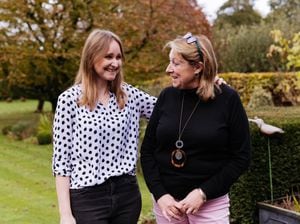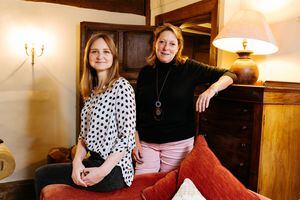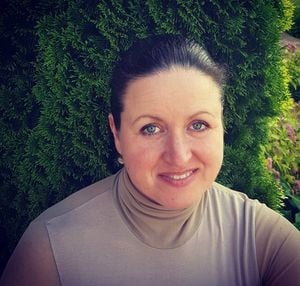Ukrainian refugees in Shropshire face uncertainty as six-month stays come to an end
Fears have been raised over Ukrainian refugees finding alternative places to live in Shropshire, as some six-month stays come to an end and it emerges several Ukrainians have become homeless since arriving in the county.

Volunteers and sponsors around the county have shared their concerns about refugees having nowhere to go, as the six-month hosting period comes to an end for some households.
Luckily for refugee Hanna Zarytska, her host in Market Drayton, Julia Farrant, has said Hanna can stay on for another 12 months.
But for some refugees this may not be possible.
Julia Farrant is on the British Red Cross committee for Shropshire – a society which has welcomed Ukrainian refugees to the country and sent support abroad through the Ukraine Crisis Appeal.
She raised concerns around refugees having to prove their earnings to a potential landlord, which, with low income jobs, can prove difficult.
"There are problems because there's a lack of social housing and the rental market as well is very difficult because a lot of people don't have the deposits and they are going to go into private rented accommodation – and that's a real issue."

Julia pointed out that in more rural areas of Shropshire, suitable accommodation may not be available, and refugees could be reluctant to move when children have settled in to local schools.
"Quite a lot of them (refugees) have been placed into nice homes and then if they are going to go into social housing, it's a big shock," Julia added.
Hanna added: "Me and my son Roman love Shropshire. We never cease to be amazed at the kindness of the people around us.
"Unfortunately, I don’t know yet what will happen next and whether we will continue to live in Shropshire, since the war taught many Ukrainians, including myself, not to plan anything in advance, but to live and enjoy today."
Figures from the Department for Levelling Up, Housing and Communities, show 24 refugees had been made homeless or put at risk of homelessness in Shropshire as of September 23.
This has increased from 20 some four weeks prior, while nationally, the number of refugee households with homelessness duties surged 22 per cent over the same period.
In Shropshire, a breakdown of the hosting arrangement was the main reason for homelessness in 18 cases – and one because their accommodation was unsuitable.
It poses a question - what is the long-term solution for Ukraine refugees who have settled in Shropshire, and where can they go?
Mariya Tsymbal moved to Market Drayton from the city of Chernivtsi in June this year, fleeing the conflict with her two young children.
She was taken in by her sponsor and has been accessing services at Market Drayton's refugee support hub at The Zone, which is run by Iana Jacobson.
Mariya said there are issues for Ukraine refugees trying to find alternative places to live, saying that lack of financial independence is a barrier some are facing.

"The Ukrainians have some difficulty finding accommodation here. I was looking into the issue of renting and ran into difficulties and I realised that, mainly, this is due to the lack of financial independence," Mariya said.
"The Ukrainians who have arrived now left their country because of the war in search of a safe place to live for themselves and their children. Therefore, most of them do not have savings.
"This makes it difficult to pay a deposit for rent, for example. In addition, at first there is no long work experience and no credit history in the UK.
"From my experience, I understand that when evaluating a candidate for rental housing, the reliability of his financial condition is assessed.
"Today, according to the law, Ukrainians have the right to live for six months in a host family, perhaps this period is too short to establish oneself as a reliable independent payer."
Mariya went on to say that Market Drayton is a cosy town which has everything a family could want, but opportunities for work were in short supply.
"Since my children are not older and require supervision, I do not have the opportunity to work full time for the time being. I am currently in training for part-time work," Mariya added.
She thanked Iana and the team at the support hub, as well as Shropshire Council, who have helped refugees to resolve some of these issues.

"Now alarms and explosions continue to sound in Ukrainian cities. And no one knows when this war will end. So for now, England continues to be a safe place for my children and for me," Mariya added.
"So, of course, I want to stay in Shropshire and would like to move to my place here in the future."
Luckily for Mariya also, her sponsor stepped in to help, and said that she and her family could continue to stay on at the home in Market Drayton for the foreseeable future.
Helen Harvey, director of Help Ukraine Telford, also said there is an issue – a lot of people, both hosts and refugees, signed up for six months and now cannot see an exit.
Help Ukraine Telford became a Community Interest Company (CIC) in June, after initially being set up just after the Russian invasion of Ukraine to send items over to the war-torn-country.
Its permanent base is at Meeting Point House, Southwater Square, where refugees can seek advice, support and receive help in learning the English language.
Helen is aware of one case where a family had moved into social housing with multiple occupants and the family were concerned about other residents walking into their children's room.
"It is going to be an increasing problem – and people's own financial circumstances change," Helen said.
As a host herself, Helen said the family she is accommodating for – a woman with a 15-year-old and a newborn baby – would not be able to pay the rising energy bills in their own place.
"I think there needs to be a mechanism where the council can offer some sort of incentive for landlords to provide accommodation for people," Helen said.
"So whether they are willing to act as guarantors for them if their situation broke down; I think that's the only thing I can think of that will help.
"We cannot magic houses out of thin air and there are houses around that can be rented out."
Laura Fisher, head of housing, resettlement and independent living at Shropshire Council said the majority of relationships between hosts and guests is positive, but personal circumstances change.
"In Shropshire our primary way to rehouse is to utilise the large number of hosts we have registered who were unable to link with guests initially," Laura said.
"We have approximately 300 hosts going through their initial DBS checks and property inspections and we hope to be able to re-match guests with alternative hosts in their local areas for a minimum of six months.
"The benefit of this is ongoing support for the guests and the hope that we can keep school places and employment in place."
Laura went on to say that the council has provided rent in advance and deposit funding for people searching for private accommodation, but the success of private rent is dependent on the amount of available properties and the cost of those properties.
"However it is important to note that this is the same across the board for people looking for alternative housing, not just those on the Homes for Ukraine scheme," she added.
To access support visit shropshire.gov.uk/homes-for-ukraine





